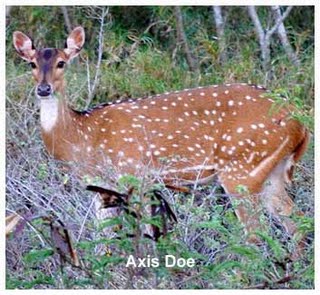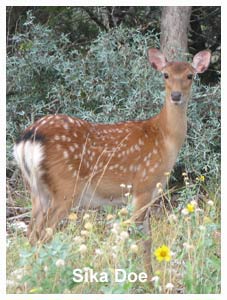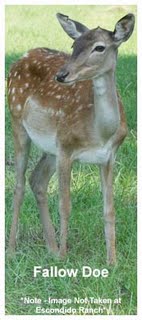Hunting Tips, Questions, Stories & Discussion
Focusing on managing Texas wildlife habitat and natural resources for native and exotic wild game species, for this and future generation of hunters and outdoor enthusiasts.Monday, September 28, 2009
An Axis Doe by Any Other Name…May Be a Sika Doe or a Fallow Doe…
It was Labor Day weekend. My family and I were once again fortunate to be invited to Escondido Ranch for the weekend festivities. The days were spent riding ATVs, swimming in the river, shooting clays or just relaxing on the balcony with a cold drink and a laid-back conversation.
 The early mornings and the evenings, however, were spent hunting! The first evening, I decided to take along my son. Knowing that hunting with an active 4.5 y.o. would be a challenge, I conceited that the evening would be spent looking at the wildlife. To make certain we had some wildlife to look at, we hunted at Windmill blind which is elevated 25-30 ft off the ground. Throughout the evening, we had several glimpses of black buck antelopes and distant sightings of whitetails. In between, my son was thoroughly involved with a slim digital camera; taking photos of himself and the surrounding country side. Some photos actually came out pretty good.
The early mornings and the evenings, however, were spent hunting! The first evening, I decided to take along my son. Knowing that hunting with an active 4.5 y.o. would be a challenge, I conceited that the evening would be spent looking at the wildlife. To make certain we had some wildlife to look at, we hunted at Windmill blind which is elevated 25-30 ft off the ground. Throughout the evening, we had several glimpses of black buck antelopes and distant sightings of whitetails. In between, my son was thoroughly involved with a slim digital camera; taking photos of himself and the surrounding country side. Some photos actually came out pretty good.
The following day, I decided that it was time to do some serious hunting. So I left my son in the company of Mommy and younger sister and tracked out on my own. It was still humid that evening from the torrential downpour the day before, but you could feel a distant encroachment of autumn. The days were getting shorter and in the evening, the temperature was notably cooler.
That late afternoon, I set out towards the Ambush blind. This particular spot is located off the beaten path, on an edge of canyon 95 yards up the slope and 130 yards away from the feeder, as the crow flies. The “blind” is really a 3x8 foot wall of pilled brush with a 2x4 thrown across two trees for shooting support. Getting down to the blind could be a bit of a challenge as well, particularly in the early morning hours. You have to follow a marked trail which winds down through the trees and stops just a few feet short of the ledge. However, I particularly like this spot, because it offers the freedom to move around (carefully) while having a clear view of the shooting lanes. The area below is a favorite hangout for axis, hogs and aoudad sheep. I was ready to take on all comers.
this spot, because it offers the freedom to move around (carefully) while having a clear view of the shooting lanes. The area below is a favorite hangout for axis, hogs and aoudad sheep. I was ready to take on all comers.
Once I got situated, I found a solid rest for my .270. This is a recent acquisition and my second time hunting with this rifle. I feel progressively more confident with the gun, particularly after a shooting session from 300 yard distance, earlier that day.
The evening started slow. Only one porcupine and a couple of squirrels were scouring around below. A bit later, a huge, lumbering “Sumo” porcupine slowly worked its way towards the feeder. It was the largest porcupine I have ever seen. It dwarfed the other porcupine still munching nearby. Whatever protein mix the ranch used as supplemental feed, if it has the same affect on the deer, it should produce some major trophies this season.
Finally, around 7:15 pm, an Axis doe showed up. There was still 45 minutes of shooting light left. I was still hoping to see my elusive prey of choice, the Aoudad, so I decided to pass. The doe pranced around the area for a few minutes and then disappeared in the nearby brush.
Time passed. It was just me and the two porcupines. The view through my scope was still clear, but I was loosing shooting light. I was second guessing myself for passing on the Axis doe.
I had only a few minutes of light left, when the same doe popped out on the other side of the feeder. Ecstatic about the second opportunity, I wasted no time in drawing my rifle. I found the Axis doe in the scope and removed the safety. Its head was down and the vitals were blocked by remnants of a fence post. I waited…When the doe finally cleared the obstruction, I squeezed the trigger. Through the clearing smoke I could see the animal fall hard to the ground. Oh yeah! Axis back strap on the menu…Yum!

 The early mornings and the evenings, however, were spent hunting! The first evening, I decided to take along my son. Knowing that hunting with an active 4.5 y.o. would be a challenge, I conceited that the evening would be spent looking at the wildlife. To make certain we had some wildlife to look at, we hunted at Windmill blind which is elevated 25-30 ft off the ground. Throughout the evening, we had several glimpses of black buck antelopes and distant sightings of whitetails. In between, my son was thoroughly involved with a slim digital camera; taking photos of himself and the surrounding country side. Some photos actually came out pretty good.
The early mornings and the evenings, however, were spent hunting! The first evening, I decided to take along my son. Knowing that hunting with an active 4.5 y.o. would be a challenge, I conceited that the evening would be spent looking at the wildlife. To make certain we had some wildlife to look at, we hunted at Windmill blind which is elevated 25-30 ft off the ground. Throughout the evening, we had several glimpses of black buck antelopes and distant sightings of whitetails. In between, my son was thoroughly involved with a slim digital camera; taking photos of himself and the surrounding country side. Some photos actually came out pretty good.The following day, I decided that it was time to do some serious hunting. So I left my son in the company of Mommy and younger sister and tracked out on my own. It was still humid that evening from the torrential downpour the day before, but you could feel a distant encroachment of autumn. The days were getting shorter and in the evening, the temperature was notably cooler.
That late afternoon, I set out towards the Ambush blind. This particular spot is located off the beaten path, on an edge of canyon 95 yards up the slope and 130 yards away from the feeder, as the crow flies. The “blind” is really a 3x8 foot wall of pilled brush with a 2x4 thrown across two trees for shooting support. Getting down to the blind could be a bit of a challenge as well, particularly in the early morning hours. You have to follow a marked trail which winds down through the trees and stops just a few feet short of the ledge. However, I particularly like
 this spot, because it offers the freedom to move around (carefully) while having a clear view of the shooting lanes. The area below is a favorite hangout for axis, hogs and aoudad sheep. I was ready to take on all comers.
this spot, because it offers the freedom to move around (carefully) while having a clear view of the shooting lanes. The area below is a favorite hangout for axis, hogs and aoudad sheep. I was ready to take on all comers.Once I got situated, I found a solid rest for my .270. This is a recent acquisition and my second time hunting with this rifle. I feel progressively more confident with the gun, particularly after a shooting session from 300 yard distance, earlier that day.
The evening started slow. Only one porcupine and a couple of squirrels were scouring around below. A bit later, a huge, lumbering “Sumo” porcupine slowly worked its way towards the feeder. It was the largest porcupine I have ever seen. It dwarfed the other porcupine still munching nearby. Whatever protein mix the ranch used as supplemental feed, if it has the same affect on the deer, it should produce some major trophies this season.
Finally, around 7:15 pm, an Axis doe showed up. There was still 45 minutes of shooting light left. I was still hoping to see my elusive prey of choice, the Aoudad, so I decided to pass. The doe pranced around the area for a few minutes and then disappeared in the nearby brush.
Time passed. It was just me and the two porcupines. The view through my scope was still clear, but I was loosing shooting light. I was second guessing myself for passing on the Axis doe.
I had only a few minutes of light left, when the same doe popped out on the other side of the feeder. Ecstatic about the second opportunity, I wasted no time in drawing my rifle. I found the Axis doe in the scope and removed the safety. Its head was down and the vitals were blocked by remnants of a fence post. I waited…When the doe finally cleared the obstruction, I squeezed the trigger. Through the clearing smoke I could see the animal fall hard to the ground. Oh yeah! Axis back strap on the menu…Yum!

When 20 minutes later, along with Kurt (our host at Escondido), we drove down into the canyon to pick up the doe, I was taken back by the discovery that I actually shot a Sika doe. Oops?!!
From my perch, 130 feet away, I was convinced that what I was seeing was, in fact, an Axis doe. The same coloration, the same size, the same features ….or were they?
Upon a closer inspection of the doe; two distinct variations became apparent. Unlike an Axis doe which has a white throat patch on the neck, a Sika doe has a tan neck and an apparent, fluffy rump. I was accustomed to seeing solid colored Sika does at the ranch, so when I saw a typical Axis pattern of white dots on a tan hide, it did not even occur to me to consider other possibilities.
Furthermore, to add another twist to this saga, Fallow deer, which are abundant at Escondido ranch, could also come in an “Axis” pattern. The most distinguishing feature for Fallow doe, however, is the pronounced Adam’s apple along with an elongated neck.
At the end, after a series of jokes and cute comments at my expense, we left the Sika doe in the walk-in cooler and went back to the main house for a gourmet meal of grilled Red Snapper and boiled jumbo shrimp, products of our spearfishing forays into the Gulf of Mexico.
Spearfishing, which is a passion (borderline obsession) we share with Kurt is another story altogether...
From my perch, 130 feet away, I was convinced that what I was seeing was, in fact, an Axis doe. The same coloration, the same size, the same features ….or were they?
Upon a closer inspection of the doe; two distinct variations became apparent. Unlike an Axis doe which has a white throat patch on the neck, a Sika doe has a tan neck and an apparent, fluffy rump. I was accustomed to seeing solid colored Sika does at the ranch, so when I saw a typical Axis pattern of white dots on a tan hide, it did not even occur to me to consider other possibilities.
Furthermore, to add another twist to this saga, Fallow deer, which are abundant at Escondido ranch, could also come in an “Axis” pattern. The most distinguishing feature for Fallow doe, however, is the pronounced Adam’s apple along with an elongated neck.
At the end, after a series of jokes and cute comments at my expense, we left the Sika doe in the walk-in cooler and went back to the main house for a gourmet meal of grilled Red Snapper and boiled jumbo shrimp, products of our spearfishing forays into the Gulf of Mexico.
Spearfishing, which is a passion (borderline obsession) we share with Kurt is another story altogether...
Labels: fallow doe hunt, sika doe hunting, texas axis doe hunts
Comments:
<< Home
There is no better feeling of hunting success than the one you experience after bringing down a big trophy. I have never caught Axis Doe, but I believe the feeling is amazing. I have caught a bear in the company of an expert. See more: http://wildernessmastery.com/hunting/grizzly-bear-hunting-tips.html
Thanks for taking the time to share this article here about the hunting. Your tips are very informative and useful for those who are interested to know more about the hunting. Keep sharing this type of articles here. argentina dove and duck hunting
Great article Lot's of information to Read...Great Man Keep Posting and update to People..Thanks https://archerytopic.com/best-ground-blind-for-bowhunting
Post a Comment
Subscribe to Post Comments [Atom]
<< Home
Archives
December 2008 January 2009 February 2009 April 2009 May 2009 June 2009 July 2009 August 2009 September 2009 November 2009 December 2009 January 2010 February 2010 March 2010 July 2010 August 2010 October 2010 November 2010 December 2010 January 2011 July 2011 August 2011 September 2011 December 2011 January 2012 February 2012 September 2012 July 2014
Subscribe to Comments [Atom]



